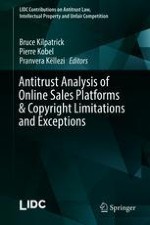
2018 | OriginalPaper | Buchkapitel
1. International Report
verfasst von : João Marcelo de Lima Assafim
Erschienen in: Antitrust Analysis of Online Sales Platforms & Copyright Limitations and Exceptions
Aktivieren Sie unsere intelligente Suche, um passende Fachinhalte oder Patente zu finden.
Wählen Sie Textabschnitte aus um mit Künstlicher Intelligenz passenden Patente zu finden. powered by
Markieren Sie Textabschnitte, um KI-gestützt weitere passende Inhalte zu finden. powered by